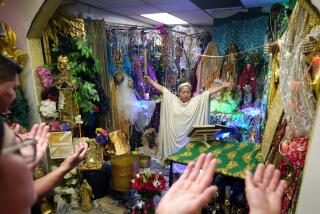Catholic Bishops Near to Adopting Spanish Book of Liturgy Prayers
- Share via
WASHINGTON — It took 14 years, but the nation’s Roman Catholic bishops are close to having a single text of liturgy prayers in Spanish to help them minister to a rising number of Latino Americans.
Latinos are expected to be a majority of U.S. Catholics within 25 years. The National Conference of Catholic Bishops, before ending a three-day meeting this week, began voting on a Spanish translation of a book of prayers called the sacramentary, which priests use at Mass. Results won’t be known until mail-in ballots are counted, but it is expected to be approved.
Once that occurs, the Vatican still would have to put its stamp of approval on the book before it could be used in Catholic churches across America.
Spanish-speaking Catholics use as many as a half-dozen liturgy prayer books--translations being used in Mexico, Spain and other Spanish-speaking countries.
“The Spanish spoken in Spain is different from the Spanish spoken in Mexico. So in our country we faced the situation where we had all these different Spanish-speaking groups--from Spain, Cuba, Puerto Rico or wherever--all using different books with slightly different translations, slightly different collections of prayers,” said the Rev. James P. Moroney, executive director of the bishops’ committee on the liturgy.
“It’s not necessarily bad, but what happens if in one parish you have some people from Cuba and some people from Puerto Rico? Whose book do you use?”
The bishops’ conference estimates that in 1994, there were between 19 million and 21.6 million Catholics of Hispanic origin in the United States.
“It will affect all Spanish-speaking Catholics in the United States,” Moroney said of the new Spanish sacramentary. “A Spanish Mass is available in almost every city in this country right now. And in the Southwest, I think you would find that there are more Masses in Spanish than there are in English.”
Using the same Spanish text throughout the country will help eliminate differences in certain words as they originate from Spain, Mexico and other countries, said Bishop Joseph Fiorenza of Galveston, Texas. For example, to reflect the Spanish spoken in the United States, the new sacramentary uses “ustedes,” the plural of “you” common in Mexico, instead of the informal “vosotros” used in Spain.
Bishop Roberto Gonzalez of Corpus Christi, Texas, offered another example that avoids the gender issue. Instead of the phrase “trabajo de hombres,” which means “work of men,” the preferred Spanish text of one of the offertory prayers states “trabajo humano,” which means “human work.”
The Spanish sacramentary also includes liturgical texts for feasts celebrated in some Catholics’ native Caribbean and Latin American countries. Moroney said this allows a Catholic in Miami to celebrate the same feast, for example, that he celebrated while growing up in Cuba.
More to Read
Sign up for Essential California
The most important California stories and recommendations in your inbox every morning.
You may occasionally receive promotional content from the Los Angeles Times.








